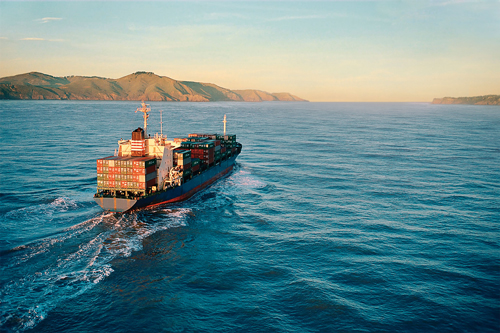Launched in 2011, Kotahi is a joint venture between Fonterra and Silver Fern Farms, delivering freight management services for more than 30 customers. On the eve of his departure from the CEO role, Chris Greenough reflects on its achievements.
EXPORTER: Where did the idea for Kotahi come from? Was there a defining moment that set the wheels turning to its establishment?
Chris: I joined Fonterra in 2008 to spearhead a strategic review of the Co-operative’s ocean and land freight providers. It was clear that New Zealand, as an export nation, is geographically located a long way from many key markets. We faced an ocean freight disadvantage, unstable service and the potential risk that New Zealand would become a spoke to the larger hubs across the Tasman, which would add significantly to export and import transit times. It was also apparent that these issues could only be solved by working collaboratively with other like-minded players; and so Kotahi was formed.
Exporter: Why did you take on the CEO’s role at Kotahi, and what were your expectations when you first took up the reins in 2011?
Chris: I love a challenge! It was a natural progression from my role at Fonterra. It was an opportunity to build a company, develop a brand and lead significant changes in the way the logistics industry collaborates with partners. I could see that there was opportunity for New Zealand businesses to work together to lift the performance of the country’s supply chain.
Exporter: Has the reality matched those expectations? And what would you say have been Kotahi’s greatest achievements or milestones over those four years?
Chris: Yes definitely. Over the past four years Kotahi has established a strong, diverse customer base representing key sectors – including meat export, wool, dairy, timber, pharmaceuticals, horticulture and seafood.
The separate ten year volume commitments with Maersk Line and Port of Tauranga represent a new way of working. This type of committed collaboration was a first for the industry. These agreements will drive ocean freight efficiencies by improving the use of ports around New Zealand and introducing larger, more fuel efficient, ships carrying up to 6,500 TEU (twenty foot equivalent) containers. Currently the largest vessels calling on New Zealand are 4,500 TEU.
The launch of Coda, a joint venture with Port of Tauranga, will focus on identifying efficiencies in land-based transport. Coda’s business is focused on consolidating cargo at key hub ports ready for larger ships, and better co-ordinating truck and rail movements to find efficiencies in the domestic supply chain.
Exporter: What are the next projects on the radar for Kotahi? And what outcomes will they produce for New Zealand’s exporters and importers?
Chris: The next 12 to 18 months will see the first larger ships (6,500 TEU) visit New Zealand. This will be an exciting time for the business as it will see the fruits of our strategy to date.
There is still more work to be done on finding efficiency gains in the movement of shipping containers around New Zealand and providing more certainty for all players in the supply chain, such as ports, shippers, rail or freight-forwarders.
Exporter: Why has the Kotahi business model worked so successfully? And where would you like the business to be after another four to five years?
Chris: Collaboration with partners and like minded businesses has been the underlying success for Kotahi. We champion joined-up thinking by promoting cargo pooling and long term partnerships. In another four to five years I’d like to see greater supply chain certainty, co-ordination and competitiveness for businesses across New Zealand, Australia and the wider Asia-Pacific region.
Exporter: What else is unique or innovative about the way Kotahi is managed?
Chris: We have a values-based approach to the way we work. The team has grown to more than 60 employees and all of them understand Kotahi’s business strategy and the bigger picture for ‘New Zealand Inc’. We work in a complex environment with infrastructure partners, customers, ocean carriers, shareholders and we’ll be working closer with the team at Coda in the coming year.
Exporter: What other initiatives or developments would you like to see happen in New Zealand’s freight and logistics sector?
Chris: We’re reshaping the way Kiwis take their products to the world and there is opportunity for more like-minded businesses to work together. There is still a lot of room for more collaboration.
There is an opportunity to work with local and central government to build an understanding of the unique supply chain issues that face our exporters and importers from a national perspective rather than as individual local regions.
Exporter: What are some of the key principles you align your personal management style with?
Chris: Maintain and communicate a clear vision and plan, be consistent and stay the course. Trust in the individual is rarely misplaced; and remember, over time your team will behave as you do.
Exporter: What legacy would you like to leave from your time at Kotahi?
Chris: This month I start a new role at Fonterra as director, Strategic Portfolio Management. Kotahi is in a strong position, the major building blocks for more efficient supply chains for NZ Inc are in place and I’m proud of my team that is passionately delivering on strategy.
I have thoroughly enjoyed working with our great customers and the business partners that have joined us on this incredible journey.

